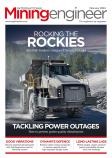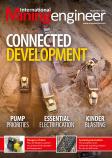Randgold Resources’ chief executive Mark Bristow discusses the issues of sustainable mining and the impact for local communities
The Loulo-Gounkoto gold mining complex is the largest of its kind in Mali and one of the largest in Africa. Randgold Resources owns 80% of the complex with the state of Mali holding the rest.
Loulo-Gounkoto currently accounts for some 8% of the country’s GDP. In addition to the substantial contribution it makes to the Malian treasury in the form of dividends, taxes and royalties, Loulo-Gounkoto’s success has also enabled it to provide a wide range of life-changing benefits to local communities.
“Our principle commitment is on the three primary foundations of society … and that’s clean water, primary education and primary health. And when it comes to clean water it’s not negotiable. If we see an opportunity to supply clean water we do. We’ve measured the impact of that on mortality rates, on every aspect of personal hygiene. Clean water has a massive impact. Likewise with primary health, whether its maternity, pre-natal, education, and post-birth child care. That reinvests back into the family units, making sure people are responsible for their children and about having children, ” says Mark Bristow, Randgold Resources’ chief executive.
Mr Bristow, a geologist with a PhD from Natal University, South Africa, has held board positions at a number of global mining companies and is non-executive chairman of Rockwell Resources International. Has also played a significant part in promoting the emergence of a sustainable mining industry in Africa.
He outlines three key steps in achieving sustainable mining: profitable mines, investment in skills and education.
“The first thing is that to have profitable mines. That’s the biggest project one can deliver on. We’re one of the largest employers in the country outside government and we’re one of the largest taxpayers. So the taxes we pay get very close, if not cover, the national civil service tax bill. That the first and most important thing a mining company should do.”
Randgold contributes to national skills growth in Mali through scholarship programmes, hands-on training and career development. As a direct result of this effort, Loulo-Gounkoto is managed and operated by an almost entirely Malian team, with the country’s nationals accounting for 94% of the total workforce.
“When it comes to Rangold’s mines, it is a worldclass operation with world class skills and we’ve created some seven-and-half-thousand new jobs in Mali. Those are direct jobs,” says Mr Bristow.
The third step is primary education. “If you don’t get young people into the classrooms then you just can’t make a difference in society.”
But building schools is not enough. “What we really need to measure is how many children we educate properly and the quality of that education … you can build all the schools in the world but, if you don’t have teachers, you can’t deliver the best. So what we do now is measure pass rates rather than brag about how many schools.”
In addition, the Rangold has set up community-led commissions to direct each of its strategic community investment sectors, including potable water provision, education, healthcare and food security. Investment projects are run by the community, with guidance from Loulo-Gounkoto’s management.
Another initiative is the development of local agribusinesses. The relevant community development committees are being converted into co-operatives, which will secure agricultural land selected by the communities and tested by Mali’s National Agricultural Institute. Construction of an agricultural training centre will also start this month and a number of pilot projects, which will serve as training units, have been identified.
“We invest not in trying to perpetuate subsistence farming but it’s about how do we take subsistence activities and convert them into real economic businesses that have a margin.”
To boost the local economy generally, the complex will fund a microfinance provider to help finance small business initiatives, particularly those started by the women in the community.
One of the issues Rangold still has to address together is the challenge of illegal mining, which impacts on Loulo-Gounkoto’s capacity to deliver these benefits and threatens the integrity of Mali’s vitally important national assets, damaging the environment and exploiting sectors of the community.
Illegal mining is “the scourge of Africa,” says Mark Bristow, leading to, child labour, enslavement of women and massive environmental degradation.
Randgold Facts Box
Major Randgold discoveries to date include the 7.5Moz Morila deposit in southern Mali, the 7Moz Yalea deposit and the 5.5Moz Gounkoto deposit, both in western Mali, the 4Moz Tongon deposit in the Côte d’Ivoire and the 3Moz Massawa deposit in eastern Senegal.
Randgold financed and built the Morila mine which, since October 2000, has produced more than 6Moz of gold and distributed more than US$2 billion to stakeholders. It also financed and built the Loulo operation which started as two open pit mines in November 2005. Since then, two underground mines have been developed at the Yalea and Gara deposits.
The company’s Tongon mine in Côte d’Ivoire poured its first gold in November 2010. Gounkoto, south of Loulo, delivered first ore to the Loulo plant in June 2011 and paid its first dividends to shareholders in mid-2012.
In 2009, the company acquired a 45% interest in the Kibali project in the Democratic Republic of Congo (DRC), which at 12Moz of mineral reserves is one of the largest gold deposits in Africa. Gold production started in the third quarter of 2013, ahead of schedule.





















